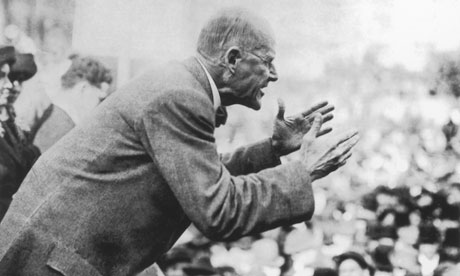To that end, I'm taking a day off blogging today to honor the workers. Instead, I'm reprinting this article from PBS about the history of Labor Day and how we have unions and radicals to thank for this holiday. Hail hail.
From PBS' Jim Lehrer Online News Hour:
| Pullman, Illinois was a company town, founded in 1880 by George Pullman, president of the railroad sleeping car company. Pullman designed and built the town to stand as a utopian workers' community insulated from the moral (and political) seductions of nearby Chicago. The town was strictly, almost feudally, organized: row houses for the assembly and craft workers; modest Victorians for the managers; and a luxurious hotel where Pullman himself lived and where visiting customers, suppliers, and salesman would lodge while in town. Its residents all worked for the Pullman company, their paychecks drawn from Pullman bank, and their rent, set by Pullman, deducted automatically from their weekly paychecks. The town, and the company, operated smoothly and successfully for more than a decade. But in 1893, the Pullman company was caught in the nationwide economic depression. Orders for railroad sleeping cars declined, and George Pullman was forced to lay off hundreds of employees. Those who remained endured wage cuts, even while rents in Pullman remained consistent. Take-home paychecks plummeted. And so the employees walked out, demanding lower rents and higher pay. The American Railway Union, led by a young Eugene V. Debs, came to the cause of the striking workers, and railroad workers across the nation boycotted trains carrying Pullman cars. Rioting, pillaging, and burning of railroad cars soon ensued; mobs of non-union workers joined in. The strike instantly became a national issue. President Grover Cleveland, faced with nervous railroad executives and interrupted mail trains, declared the strike a federal crime and deployed 12,000 troops to break the strike. Violence erupted, and two men were killed when U.S. deputy marshals fired on protesters in Kensington, near Chicago, but the strike was doomed. On August 3, 1894, the strike was declared over. Debs went to prison, his ARU was disbanded, and Pullman employees henceforth signed a pledge that they would never again unionize. Aside from the already existing American Federation of Labor and the various railroad brotherhoods, industrial workers' unions were effectively stamped out and remained so until the Great Depression. It was not the last time Debs would find himself behind bars, either. Campaigning from his jail cell, Debs would later win almost a million votes for the Socialist ticket in the 1920 presidential race. | |
| In an attempt to appease the nation's workers, Labor Day is born | |
| The movement for a national Labor Day had been growing for some time. In September 1892, union workers in New York City took an unpaid day off and marched around Union Square in support of the holiday. But now, protests against President Cleveland's harsh methods made the appeasement of the nation's workers a top political priority. In the immediate wake of the strike, legislation was rushed unanimously through both houses of Congress, and the bill arrived on President Cleveland's desk just six days after his troops had broken the Pullman strike. 1894 was an election year. President Cleveland seized the chance at conciliation, and Labor Day was born. He was not reelected. In 1898, Samuel Gompers, head of the American Federation of Labor, called it "the day for which the toilers in past centuries looked forward, when their rights and their wrongs would be discussed...that the workers of our day may not only lay down their tools of labor for a holiday, but upon which they may touch shoulders in marching phalanx and feel the stronger for it." | |
| Labor Day: a good-bye to summer | |
| Almost a century since Gompers spoke those words, though, Labor Day is seen as the last long weekend of summer rather than a day for political organizing. In 1995, less than 15 percent of American workers belonged to unions, down from a high in the 1950's of nearly 50 percent, though nearly all have benefited from the victories of the Labor movement. And everyone who can takes a vacation on the first Monday of September. Friends and families gather, and clog the highways, and the picnic grounds, and their own backyards -- and bid farewell to summer. | |


No comments:
Post a Comment